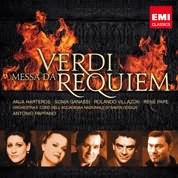If you love Verdi’s Requiem as much as I do you can get awfully picky about modern recordings of the work. But there’s not much to be picky about in Antonio Pappano’s excellent version; he straddles the line between the work’s theatrical and “spiritual” sides and conveys important structural features without slighting details. In that respect he reminds me of Guilini–not in the famous EMI recording, but in the BBC Live performances that have more spark and dynamism. Pappano here commands a wide dynamic range and is about as idiomatic a Verdian as we have today.
The recording stems from live concert performances in Rome where, as he did with the Royal Opera, Covent Garden, Pappano has revitalized the orchestra and chorus of the Santa Cecilia Academy. The chorus sings with the requisite power and intimacy while the orchestra is up to the demands of this demanding work, both as an ensemble and in the telling orchestral details.
The solo quartet–often the weak point in many performances–is as good or better than most. Soprano Anja Harteros almost steals the show. Her Libera me probably is the best since Leontyne Price’s performance in the Fritz Reiner recording, and it’s miles ahead of Joan Sutherland’s petulant little-girl-pleading-for-salvation in the classic Georg Solti version. Harteros’ voice is just big enough to inhabit the part, but it’s lovely nonetheless; she nails the cruelly difficult B-flat in the Libera me, is luminous in the Agnus Dei, and is expressive throughout. In the ravishing Recordare duet with Sonia Ganassi the voices blend nicely, the mezzo copes well with her part’s low notes, and she sings with feeling. As you’d expect, René Pape is outstanding, too, providing a firm foundation for the ensemble and varying his tone with telling effect in the Confutatis. Rolando Villazon is the weakest link in the foursome; a bit colorless in the Ingemisco, too throaty in the half-voice opening of the Hostias, and, like many tenors, he makes only the feeblest of stabs at the trills there. He’s not bad, just not up to the best of his recorded predecessors.
The engineering sports enormous dynamic range, almost too much for home listening, where the choral opening is barely audible–and if the volume is boosted to hear it properly, then the start of the Dies irae will blast you out of your seat. However, if you’re willing to twiddle with the volume, the great bass drum thwacks will thrill, and even at high levels the great dramatic choral parts of the Dies irae and Tuba mirum are as transparent as I’ve heard on recordings. There are many Verdi Requiems available, but Pappano’s comfortably resides among the top handful. [6/28/2010]
































